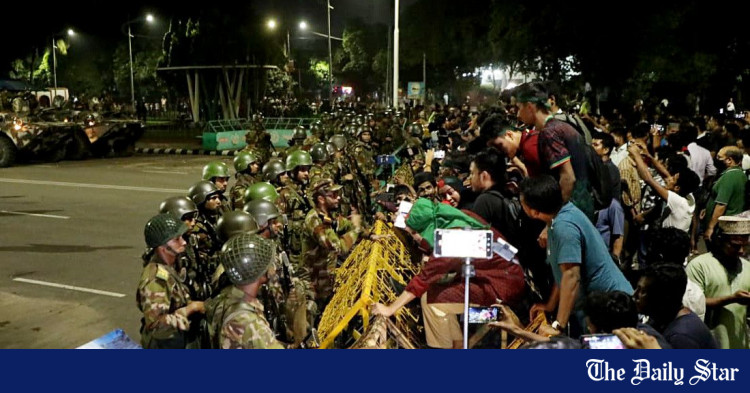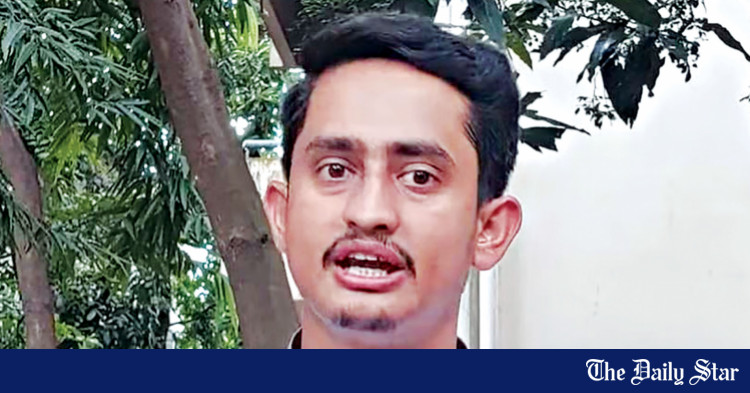Saif
Senior Member
- Joined
- Jan 24, 2024
- Messages
- 17,262
- Likes
- 8,334
- Nation

- Residence

- Axis Group


Ali Riaz for resisting pillars of fascism to materialise possibilities of July uprising
Constitution Reform Commission head Professor Dr Ali Riaz on Saturday put emphasis on evicting the pillars of fascism, based on which the recently ousted Awami League (AL) government ruled the country, to materialise the possibilities of July uprising. “The fascism lasted for the last 15 yea
Ali Riaz for resisting pillars of fascism to materialise possibilities of July uprising
BSS
Published :
Oct 19, 2024 23:43
Updated :
Oct 19, 2024 23:43

Constitution Reform Commission head Professor Dr Ali Riaz on Saturday put emphasis on evicting the pillars of fascism, based on which the recently ousted Awami League (AL) government ruled the country, to materialise the possibilities of July uprising.
“The fascism lasted for the last 15 years depending on four pillars- institution, ideological hegemony, mass media and foreign powers . . . we have to tackle strongly these four pillars to prevent the recurrence of the fascism,” he said.
Dr Riaz, also professor of political science at Illinois State University (ISU) in the USA, said this while addressing a discussion titled ‘Stories of injured poets and writers in July Uprising’ organized by Literary Magazine Kaler Dhani at Dhaka College Auditorium in the city this evening.
With the fall of the autocratic AL government, he said, “We have witnessed the collapse of the first phase of fascism. And we are now going to enter the second phase of continuation of struggle against fascism”.
Noting that the previous fascist government had institutionalized the enforcement of extra force and intimidating people to cling onto power, the noted political scientist said, adding that it had also created an ideological hegemony.
Sometimes the hegemony was termed as Liberation War spirit through it was contrary to the Liberation War, he said, adding that narratives of development, glorifying individual and a special narrative of history were created to continue the fascism.
In the last 15 years, the so-called intellectuals accepted the slavery selling out their consciences, which was never seen in the country before, Dr Riaz added.
He said Bangladeshi intellectuals, poets and writers played vital roles during the 1969 and 1990 mass uprisings, but for the first time in the country so called and established intellectuals, writers, artistes and literateures did not join movement (July uprising) this time as the hegemony created in the name of ideology in exchange of money, property and facilities achieved a victory.
The noted political scientist emphasized on creating an alternative cultural hegemony and independent thought to challenge the ideological hegemony that is still prevailing in the society.
Noting that media cannot emerge as mass media in the country due to ownership manner, Dr Riaz said a big weakness of Bangladesh’s media is that there is no corporate media in the country; rather, the media turned into weapons to protect the interests of other corporate institutions.
As the country was ruled following the kleptocratic system and an elite group had a close relation with the government due to media ownership, he said, they had no option other than serving the autocratic regime for their own interest.
He emphasized on taking measures for supervising media independently and creating basic ethics so that the media can play its proper role and does not worship any individual.
Mentioning that foreign powers, especially India and China, helped the fascism to last for 15 years, Dr Riaz said, “If you do not want to let the fascism to return, you should be nationalist and safeguard the national interest”.
Shaheed Abrar Fahad’s younger brother Abrar Faiyaz, Jatiya Nagorik Committee Member Secretary Akhter Hossain, Dr Sakira Nova, writer and journalist Amirul Momenin Manik, journalist and researcher Dr Kajal Rashid Shaheen, writer Mohammad Nazim Uddin, Kabi Nazrul Institute Executive Director Md Latiful Islam Shibli, International Mother Language Institute Director Dr Mohammad Ashaduzzaman and columnist Shahidullah Farayezi spoke as guests.
Besides, among injured poets and writers Hasan Afif, Shah Hujaifa Ferdous, Hasan Imam, Masud Nur, Sherif Faruqui, Quader Mazhar, Ibrahim Nirob, Al Nahiyan, Md Asadullah, Morshed Alam Hridoy, Aktar Zaman and Saleh Ahmed Khasru shared their stories.
Kaler Dhoni Editor Imran Mahfuz and writer Zubayer Ibn Kamal moderated the event.
BSS
Published :
Oct 19, 2024 23:43
Updated :
Oct 19, 2024 23:43
Constitution Reform Commission head Professor Dr Ali Riaz on Saturday put emphasis on evicting the pillars of fascism, based on which the recently ousted Awami League (AL) government ruled the country, to materialise the possibilities of July uprising.
“The fascism lasted for the last 15 years depending on four pillars- institution, ideological hegemony, mass media and foreign powers . . . we have to tackle strongly these four pillars to prevent the recurrence of the fascism,” he said.
Dr Riaz, also professor of political science at Illinois State University (ISU) in the USA, said this while addressing a discussion titled ‘Stories of injured poets and writers in July Uprising’ organized by Literary Magazine Kaler Dhani at Dhaka College Auditorium in the city this evening.
With the fall of the autocratic AL government, he said, “We have witnessed the collapse of the first phase of fascism. And we are now going to enter the second phase of continuation of struggle against fascism”.
Noting that the previous fascist government had institutionalized the enforcement of extra force and intimidating people to cling onto power, the noted political scientist said, adding that it had also created an ideological hegemony.
Sometimes the hegemony was termed as Liberation War spirit through it was contrary to the Liberation War, he said, adding that narratives of development, glorifying individual and a special narrative of history were created to continue the fascism.
In the last 15 years, the so-called intellectuals accepted the slavery selling out their consciences, which was never seen in the country before, Dr Riaz added.
He said Bangladeshi intellectuals, poets and writers played vital roles during the 1969 and 1990 mass uprisings, but for the first time in the country so called and established intellectuals, writers, artistes and literateures did not join movement (July uprising) this time as the hegemony created in the name of ideology in exchange of money, property and facilities achieved a victory.
The noted political scientist emphasized on creating an alternative cultural hegemony and independent thought to challenge the ideological hegemony that is still prevailing in the society.
Noting that media cannot emerge as mass media in the country due to ownership manner, Dr Riaz said a big weakness of Bangladesh’s media is that there is no corporate media in the country; rather, the media turned into weapons to protect the interests of other corporate institutions.
As the country was ruled following the kleptocratic system and an elite group had a close relation with the government due to media ownership, he said, they had no option other than serving the autocratic regime for their own interest.
He emphasized on taking measures for supervising media independently and creating basic ethics so that the media can play its proper role and does not worship any individual.
Mentioning that foreign powers, especially India and China, helped the fascism to last for 15 years, Dr Riaz said, “If you do not want to let the fascism to return, you should be nationalist and safeguard the national interest”.
Shaheed Abrar Fahad’s younger brother Abrar Faiyaz, Jatiya Nagorik Committee Member Secretary Akhter Hossain, Dr Sakira Nova, writer and journalist Amirul Momenin Manik, journalist and researcher Dr Kajal Rashid Shaheen, writer Mohammad Nazim Uddin, Kabi Nazrul Institute Executive Director Md Latiful Islam Shibli, International Mother Language Institute Director Dr Mohammad Ashaduzzaman and columnist Shahidullah Farayezi spoke as guests.
Besides, among injured poets and writers Hasan Afif, Shah Hujaifa Ferdous, Hasan Imam, Masud Nur, Sherif Faruqui, Quader Mazhar, Ibrahim Nirob, Al Nahiyan, Md Asadullah, Morshed Alam Hridoy, Aktar Zaman and Saleh Ahmed Khasru shared their stories.
Kaler Dhoni Editor Imran Mahfuz and writer Zubayer Ibn Kamal moderated the event.









































